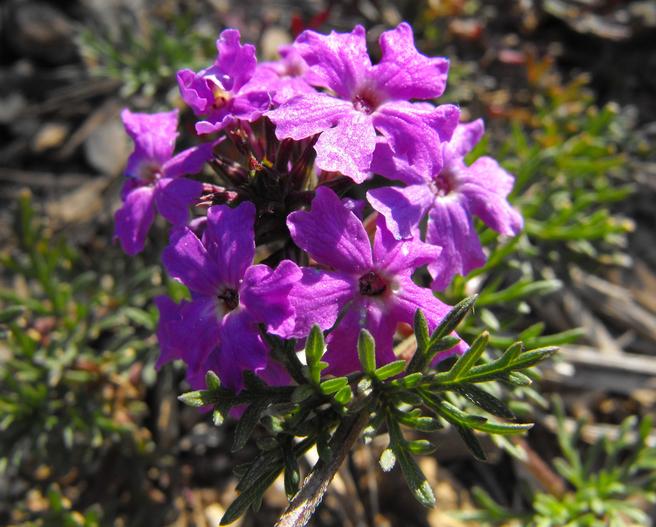Latin American Mock Vervain
(Glandularia pulchella)
Latin American Mock Vervain (Glandularia pulchella)
/
/

Stickpen
Public domain
Image By:
Stickpen
Recorded By:
Copyright:
Public domain
Copyright Notice:
Photo by: Stickpen | License Type: Public domain | License URL: https://creativecommons.org/public-domain/ | Uploader: Stickpen | Publisher: Wikipedia Commons




































Estimated Native Range
Summary
Glandularia pulchella, commonly known as Latin American mock vervain, is a perennial herb in the verbena family, native to South American grasslands, particularly in Brazil, Argentina, and Uruguay. It has naturalized in other regions, often found along roadsides. This plant typically grows with one or more stems that may be decumbent to erect and can vary from hairy to hairless. The leaves are deeply lobed, rough-haired, and arranged oppositely along the stem. The inflorescence is a dense, headlike spike with many small flowers, each with a corolla up to 1.4 centimeters wide, exhibiting colors from white to purple. Latin American mock vervain blooms from late spring to early fall, offering a long flowering season.
Glandularia pulchella is appreciated for its drought tolerance and vibrant flowers, making it suitable for rock gardens, borders, and as a ground cover. It attracts butterflies and other pollinators, adding to its value in ecological plantings. It thrives in full sun and requires medium amounts of water, preferring well-drained soils. While it is generally low-maintenance, it can self-seed prolifically under favorable conditions, which may be considered invasive in some areas. To prevent unwanted spread, deadheading spent flowers is recommended.CC BY-SA 4.0
Glandularia pulchella is appreciated for its drought tolerance and vibrant flowers, making it suitable for rock gardens, borders, and as a ground cover. It attracts butterflies and other pollinators, adding to its value in ecological plantings. It thrives in full sun and requires medium amounts of water, preferring well-drained soils. While it is generally low-maintenance, it can self-seed prolifically under favorable conditions, which may be considered invasive in some areas. To prevent unwanted spread, deadheading spent flowers is recommended.CC BY-SA 4.0
Plant Description
- Plant Type: Herb
- Height: 0.3-0.6 feet
- Width: 2-3 feet
- Growth Rate: Moderate
- Flower Color: Purple
- Flowering Season: Spring, Summer, Fall
- Leaf Retention: Deciduous
Growth Requirements
- Sun: Full Sun
- Water: Medium
- Drainage: Fast
Common Uses
Bee Garden, Bird Garden, Butterfly Garden, Deer Resistant, Erosion Control, Groundcover, Hummingbird Garden, Low Maintenance, Rock Garden, Showy Flowers, Street Planting
Natural Habitat
Native to South American grasslands
Other Names
Common Names: Dillverbena
Scientific Names: , Glandularia pulchella, Verbena pulchella, Glandularia tenera, Verbena tenera, Verbena mahonetii, Glandularia pulchella var. clavellata, Glandularia pulchella var. gracilior, Verbena santiaguensis f. albiflora, Verbena tenuisecta var. glabrata
GBIF Accepted Name: Glandularia tenera (Spreng.) Cabrera